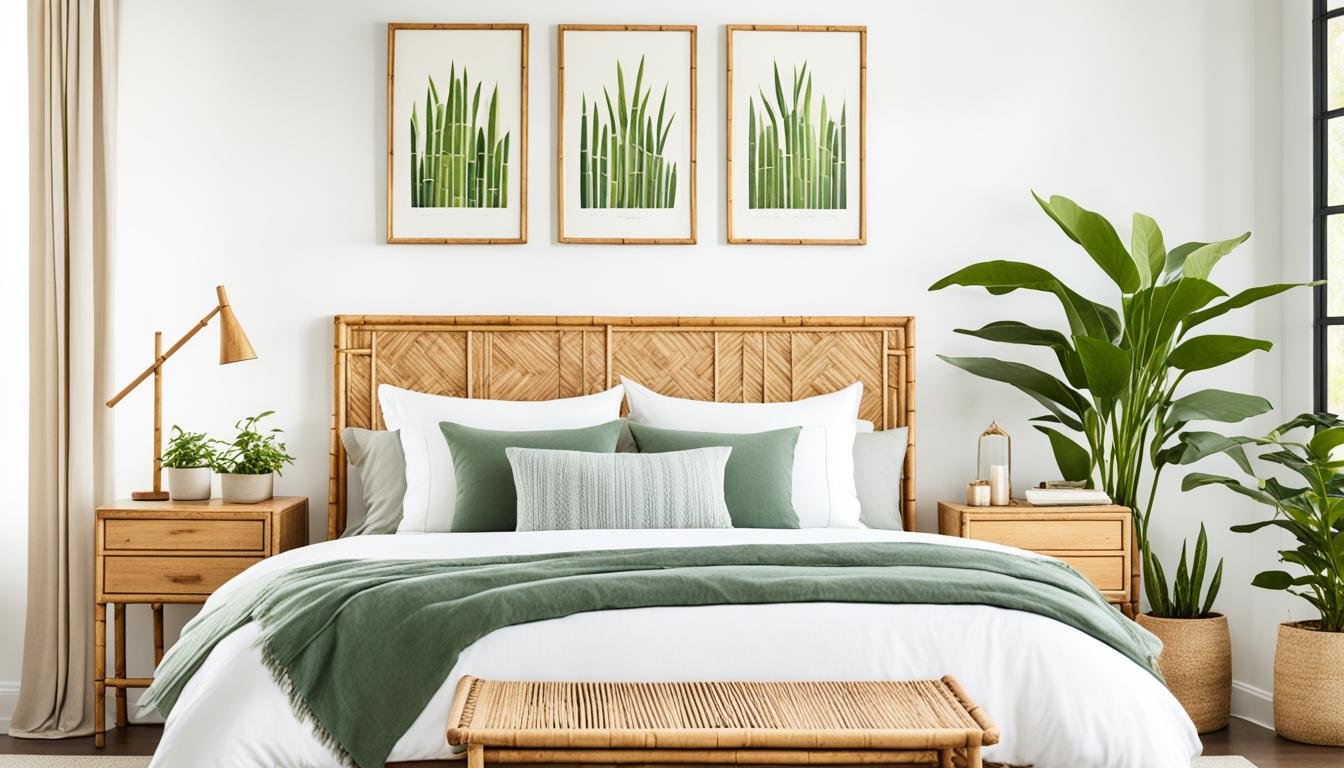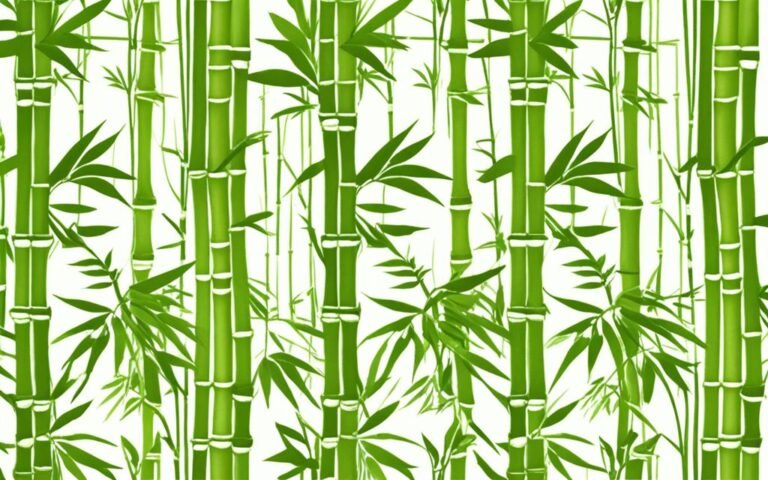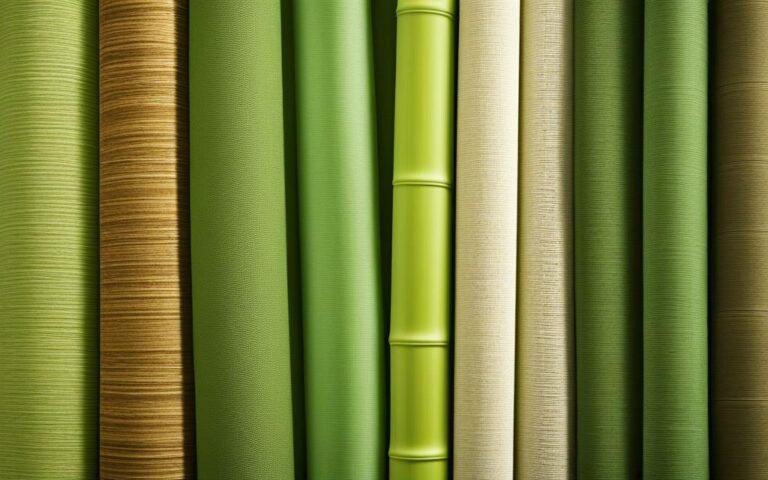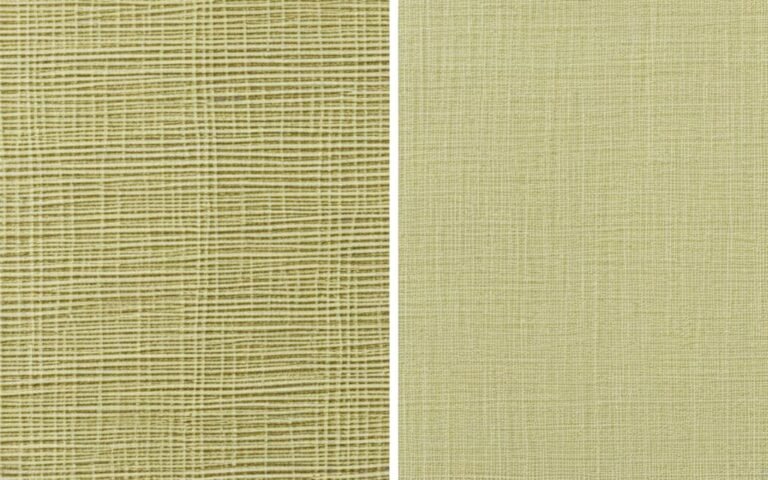Imagine a material so versatile that it can be woven into the very fabric of your home and life, presenting an eco-friendly solution to modern living. That material is bamboo, a gift from nature that provides an array of diverse uses, from innovative home design to the softest textiles touching your skin. Embrace sustainable living by discovering how bamboo uses can transform not only your household but also benefit the environment, echoing the serenity of Japan’s Sagano Bamboo Forest in every corner of your abode.
Bamboo, fast becoming the poster child for sustainable materials, forges a genuine connection with eco-conscious individuals. This remarkable, versatile material has transcended its traditional confines, permeating every aspect of daily life. With each iteration, whether as sturdy furniture, innovative home appliances, or even woven into comfortable apparel, bamboo serves as a testament to sustainable living, proving that eco-friendly choices can be synonymous with a modern, stylish life.
Key Takeaways
- Understand how bamboo’s growth efficiency contributes to a sustainable household.
- Explore diverse bamboo uses in home construction and decor that reduce environmental impact.
- Discover how bamboo fabrics can elevate your wardrobe and comfort at home.
- Learn about bamboo’s impressive ability to regenerate and its historical resilience.
- Embrace the environmental benefits of integrating bamboo products into your daily life.
- Gain insight into how bamboo culminates in an eco-friendly approach to modern living.
Find inspiration in the innovative uses of bamboo in technology and everyday items.
The Environmental Edge of Bamboo
Embracing bamboo for environmental sustainability is more relevant today than ever. As a rapidly growing renewable resource, bamboo offers distinct advantages that contribute significantly to eco-friendly practices worldwide. Its capacity to flourish in a variety of climates from arid deserts to tropical wetlands makes it a versatile choice for enhancing green spaces like bamboo gardens. Let’s delve deeper into how bamboo achieves this remarkable feat.
Bamboo’s Rapid Growth and Renewability
Bamboo is celebrated for its swift growth, reaching maturity within just a few years compared to decades-long cycles of traditional hardwoods. This rapid growth makes bamboo an excellent renewable resource, constantly rejuvenating itself after harvesting without the need for replanting. This capability ensures a continuous supply while maintaining ecological balance.
Reducing Carbon Footprint with Bamboo Cultivation
The cultivation of bamboo significantly aids in carbon sequestration, absorbing carbon dioxide and releasing oxygen at a higher rate than many tree species. By integrating bamboo into agricultural practices and urban landscaping, communities can enhance their sustainability credentials by reducing their overall carbon footprint. Additionally, the resilient nature of bamboo minimizes the need for harmful pesticides, further supporting environmental health.
Minimizing Resources for Maximum Yield
The sustainability profile of bamboo is elevated by its low water requirements and ability to thrive on degraded soils. These characteristics allow for sustainable harvesting practices that don’t compromise the health of the rhizome, ensuring that bamboo gardens can be maintained with minimal ecological disruption. As a renewable resource, bamboo stands as a symbol of efficient resource management and environmental care.
Bamboo in Construction: Building a Sustainable Future
The utilization of bamboo in construction reflects a growing commitment to sustainability. Harnessing the power of one of the fastest-growing plants on Earth, bamboo construction offers a combination of strength, durability, and environmental benefits. Various applications include everything from infrastructural support to stylish bamboo furniture, making it a key player in the push towards greener building practices.
The Strength of Bamboo in Infrastructure
Bamboo’s remarkable tensile strength, which surpasses that of steel, makes it a formidable material for large-scale constructions like bridges and buildings. This strength is complemented by bamboo’s natural flexibility, allowing structures to withstand the forces of wind and earthquake better than more rigid materials.
Bamboo Flooring: A Durable and Eco-Friendly Option
Bamboo flooring stands out not only for its aesthetic appeal but also for its durability and resistance to wear and tear. Sustainable bamboo products, including flooring, are crafted to offer longevity and low environmental impact, making them an ideal choice for eco-conscious households and businesses.
Bamboo Scaffolding: Merging Tradition with Modernity
In many parts of Asia, bamboo scaffolding remains a preferred choice for construction projects due to its cost-effectiveness and minimal environmental footprint. It exemplifies how traditional practices can merge seamlessly with modern construction needs, providing both sustainability and practical efficiency.
| Material | Strengths | Applications |
|---|---|---|
| Bamboo | High tensile strength, flexibility, eco-friendly | Structural frames, flooring, scaffolding |
| Steel | High load capacity, durability | Skyscrapers, bridges |
| Concrete | Compressive strength, longevity | Foundations, walls, highways |
Bamboo in Home Decor and Furniture
As environmental awareness grows, the shift towards bamboo home decor and eco-friendly furniture has become more prominent. Embracing bamboo not only supports sustainable home improvements, but also adds a touch of elegance to any interior design. This remarkable plant provides a durable, attractive, and sustainable resource that can be transformed into a wide array of home furnishings. Its natural aesthetics and resilience make bamboo an ideal choice for modern living spaces.
Bamboo furniture ranges from tables and chairs to more intricate pieces like bed frames and bookshelves, catering to diverse tastes and preferences. The inherent characteristics of bamboo, including its hardness and lightweight nature, make it excellent for crafting both large furniture items and smaller decorative elements. Below is a detailed table showcasing different types of bamboo furniture that can enhance any room.
| Furniture Type | Description | Benefits |
|---|---|---|
| Bamboo Chairs | Stylish and comfortable seating options crafted from bamboo. | Eco-friendly, durable, and provides a modern look. |
| Bamboo Beds | Elegant bed frames made from sturdy bamboo. | Sustainable material, lightweight, and antimicrobial properties. |
| Decorative Screens | Beautifully carved screens that double as room dividers. | Enhances privacy and decor, easily relocatable. |
| Bamboo Shelves | Functional storage solutions with a minimalist design. | Versatile, suitable for any room, and supports heavy weight. |
Introducing bamboo into your home is not just a stylish decision, but also a conscientious one. Opting for bamboo home decor and eco-friendly furniture sets a precedent for sustainable home improvements that benefit both the environment and your living space aesthetics. Its rapid renewability compared to hardwood resources solidifies bamboo’s status as a superior choice for thoughtful homeowners.
Incorporating Bamboo Into Your Wardrobe
As eco-conscious decisions become integral to our everyday lives, the shift towards eco-friendly apparel, notably bamboo clothing and bamboo linens, highlights not only a sustainable choice but a stylish and comfortable one as well. Bamboo fabrics are gaining popularity due to their soft texture, durability, and natural properties that align with an environmentally friendly lifestyle.
The Comfort of Bamboo Clothing
Bamboo clothing is not just a trend; it’s a lifestyle change that offers undeniable comfort and eco-friendly benefits. Known for its softness and thermal-regulating properties, bamboo fabric keeps you cool in summer and warm in winter, making it an excellent choice for year-round apparel. The moisture-wicking capabilities of bamboo clothing make it ideal for activewear, helping to keep the skin dry and comfortable during workouts and daily activities.
Bamboo Fabrics: Towels and Beddings
Extending the use of bamboo into the home, bamboo linens such as towels and bedding transform everyday essentials into luxuries. These bamboo products offer a softness that competes with high-end cotton but with superior absorbency and antimicrobial qualities that make it perfect for sensitive skin. Not surprisingly, bamboo linens enhance the comfort and hygiene of your living spaces.
| Product Type | Benefits | Best For |
|---|---|---|
| Bamboo Shirts | Soft, Breathable, Odor-Resistant | Daily Wear, Casual Outfits |
| Bamboo Towels | Highly Absorbent, Antimicrobial | Bathrooms, Beaches |
| Bamboo Bedding | Hypoallergenic, Moisture-Wicking | Year-Round Comfort in Bed |
By choosing bamboo clothing and linens, you are not just investing in superior quality and comfort but also contributing positively to the environment, reducing the ecological footprint one garment or linen at a time.
Bamboo in Everyday Items and Gadgets
Bamboo’s versatility extends beyond traditional uses, as it is now a core element in various everyday items and modern gadgets. Embracing bamboo technology, the material is celebrated not only for its sustainability but also for its innovative integration into daily life and technology.
Reimagining Technology with Bamboo
As eco-conscious consumers seek greener alternatives, bamboo technology has carved a niche in the tech industry. From sleek bamboo keyboard casings to elegant smartphone stands, bamboo is preferred for its durability and minimal environmental footprint. These products blend functionality with environmental stewardship, demonstrating how technology can go hand-in-hand with sustainability.
From Kitchenware to Musical Instruments
In the kitchen, everyday bamboo utensils are a popular choice for those looking to reduce plastic use. Bamboo’s natural antimicrobial properties make it an ideal material for cutting boards, cooking spoons, and salad tongs. This shift towards bamboo kitchenware supports a healthier, more sustainable culinary environment.
Moreover, bamboo musical instruments, such as flutes and xylophones, offer a sustainable alternative to their conventional counterparts, producing rich, warm sounds that are as pleasing to the ear as they are beneficial to the planet.
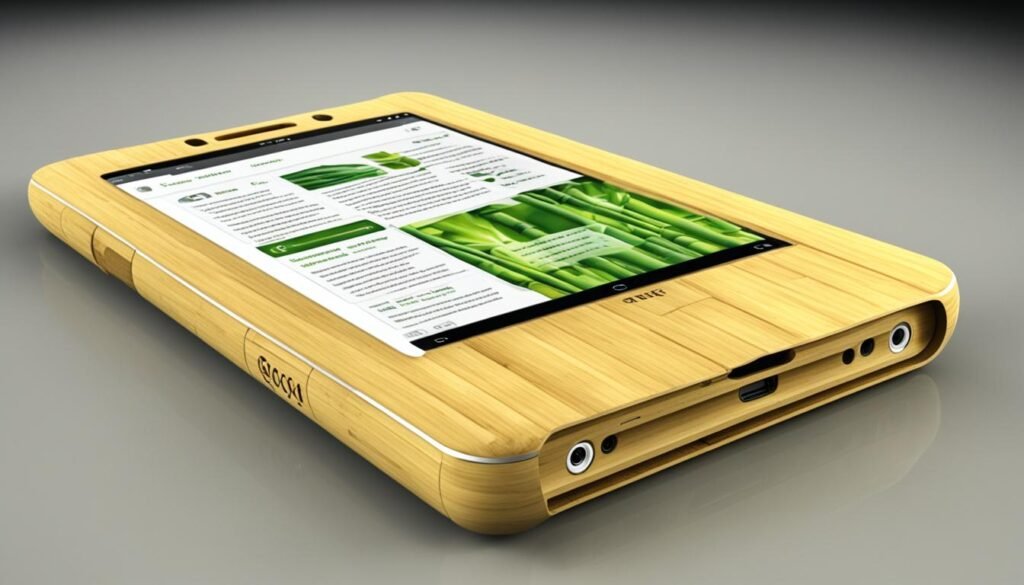
- Eco-friendly bamboo keyboard casings promote sustainable tech practices.
- Everyday bamboo utensils help reduce kitchen plastic consumption.
- Bamboo musical instruments provide eco-friendly sound options.
Through these innovations, bamboo continues to redefine its role, appealing to tech enthusiasts and eco-minded individuals alike, while providing practical, stylish, and sustainable solutions across various aspects of life.
Revolutionizing Paper Products with Bamboo
In the quest for sustainable bamboo products, the paper industry is undergoing a significant transformation, discovering the myriad benefits of bamboo as a primary resource. Unlike traditional paper options, bamboo offers a rapid regrowth rate, minimal environmental impact, and versatile usability, making bamboo paper one of the most promising eco-friendly paper alternatives today.
Bamboo paper is not only sustainable but also provides a multitude of ecological benefits thanks to its minimal water use and fast growth cycle. Cultivating bamboo for paper product manufacturing promotes forest conservation and reduces the need for harsh chemical processes typically involved in conventional paper making.
Bamboo Paper: An Eco-Friendly Choice
By turning to bamboo paper, consumers and industries alike can significantly reduce their environmental footprint. This shift supports global efforts to combat deforestation, given that bamboo can be harvested without the need to replant, flourishing again in as little as three to five years.
Bamboo Tissue and Towels: Blending Softness and Strength
Bamboo’s natural properties extend beyond simple paper sheets to include tissues and towels, combining durability and hygiene with a soft touch that is gentle on the skin. This blend of comfort and strength positions bamboo tissues as superior alternatives for those seeking both quality and sustainability in their paper products.
Embracing bamboo paper and related products represents a step forward in our commitment to protecting the planet while still enjoying the everyday products we rely on.
Bamboo’s Role in Food and Beverage
The fusion of bamboo in cuisine spans a diverse array of applications, from sustainable ingredient choices to eco-friendly food practices. Beyond its culinary adaptations as bamboo shoots, integral to Asian gastronomy, bamboo has carved a niche within beverage production.
Bamboo utensils stand out as exemplary tools, reflecting an ongoing commitment to sustainability in kitchens worldwide. These products epitomize the merger of functionality and eco-friendly food practices, as they offer a durable, recyclable alternative to conventional cooking and dining utensils.
Bamboo’s infused flavors extend into beverages such as specialty teas and beers, where it imparts a unique taste profile that’s highly valued in various culinary cultures. This particular use not only elevates the beverage’s quality but also enhances its ecological footprint.
| Bamboo Product | Use in Cuisine | Sustainability Factor |
|---|---|---|
| Bamboo Shoots | Used in Asian dishes such as stir-fries and soups | Renewable, minimizes agricultural waste |
| Bamboo Tea | Offers antioxidant benefits with a subtle flavor | Uses mature leaves, reducing plant waste |
| Bamboo Utensils | Commonly used in cooking and serving | Biodegradable, reduces plastic waste |
Adopting bamboo utensils not only aids in reducing plastic waste but also actively contributes to a cycle of sustainable and eco-friendly food practices. As culinary enthusiasts embrace bamboo in cuisine, its role continues to grow, underscoring its essential contribution to eco-conscious culinary solutions.
Bamboo-Based Health and Beauty Products
The integration of bamboo into health and beauty regimes is not just a trend but a testament to its versatile advantages. Known for its sustainability, bamboo is now a cornerstone in creating eco-friendly beauty products and health solutions. The use of bamboo health products is on the rise as people seek greener alternatives in their skincare and medicinal supplies.
Bamboo Charcoal for Skin Detoxification
Bamboo charcoal benefits the skin by drawing out impurities and reducing excess oil, which makes it an excellent ingredient for face masks and cleansers. Its porous nature allows it to absorb toxins and provide a deep clean that’s gentle yet effective. As a natural ingredient, it supports the eco-friendly beauty ethos, minimizing environmental impact while enhancing skin health.
Exploring the Medicinal Uses of Bamboo
Beyond beauty, bamboo is revered in holistic health practices for its therapeutic properties. It is commonly used in the form of teas and ointments to provide relief from various ailments, emphasizing the breadth of bamboo health products. These natural remedies underscore bamboo’s role in promoting a healthier lifestyle through eco-conscious choices.
| Product | Bamboo Content | Health Benefits |
|---|---|---|
| Bamboo Charcoal Face Mask | High concentration of bamboo charcoal | Detoxifies skin, cleanses pores |
| Bamboo Leaf Tea | 100% bamboo leaves | Rich in silica, promotes healthy skin and hair |
| Bamboo Extract Supplements | High purity bamboo extract | Supports joint health and antioxidant activity |
Fostering the adoption of bamboo health products and recognizing bamboo charcoal benefits not only promotes physical well-being but also contributes to the sustainability of the environment, supporting a healthier planet and a healthier you.
Bamboo Uses in Eco-Friendly Transportation
As industries around the globe pivot towards sustainability, the use of bamboo in eco-friendly transportation highlights a dynamic shift. With the world turning to more sustainable living solutions, bamboo emerges as a sturdy yet environmentally benign material. This section explores how bamboo signifies a pivotal turn in eco-friendly transportation, focusing on bamboo bicycles and innovations in automotive design that incorporate bamboo.
Bamboo Bicycles: Riding the Wave of Sustainability
The production of bamboo bicycles exemplifies how traditional materials can be infused into modern technology to create sustainable solutions. These bicycles leverage the robust and lightweight properties of bamboo, making them ideal for eco-friendly transportation. As bamboo grows rapidly and absorbs carbon dioxide at a higher rate than many trees, it stands out as not just a sustainable option, but a proactive aid in the fight against climate change.
Automotive Innovations with Bamboo Materials
The automotive industry is also embracing bamboo for sustainable automotive design. This includes the use of bamboo-based materials within car interiors, such as bamboo dashboards and trim elements. These features not only enhance the aesthetic appeal of the vehicle but also underscore the commitment to reducing environmental impact. Integrating bamboo into vehicles reflects an enduring trend towards eco-consciousness in design and functionality.
The intersection of bamboo with eco-friendly transportation initiatives presents a powerful case for bamboo’s role in sustainable industrial applications. Both bamboo bicycles and sustainable automotive designs not only promote a greener earth but also offer durable, high-performance alternatives to conventional materials.
Conclusion
The journey through the myriad applications of bamboo has brought us to an undeniable conclusion: this resilient and versatile plant is a cornerstone in the pursuit of a sustainable lifestyle. Our exploration has vividly illustrated how bamboo stretches from the sturdy beams of eco-friendly construction to the soft weaves of our wardrobes, cementing its place in the bamboo revolution. The remarkable intersection of traditional use and innovative technology showcases bamboo as an adaptable ally in green living.
By integrating bamboo into our lives—from the floors we tread on to the garments we wear, and from the paper we write on to the bicycles we ride—we participate in a broader, ecologically conscious movement. This choice champions not just a single material, but a philosophy that embraces nature’s offerings to foster a healthier planet. Embracing bamboo’s potential helps us reimagine and reshape a world where sustainability is woven into the essence of every industry.
As we continue to innovate and evolve, the significance of bamboo can only grow. Its role in advocating for eco-friendly solutions across the globe is not just impressive but essential. Engaging with bamboo products, we all contribute to a more sustainable world—one where the bamboo revolution is not merely a trend, but a lasting embodiment of our commitment to the Earth’s future.
FAQ
What are some common uses of bamboo in everyday living?
Bamboo is extremely versatile and used for an array of everyday items such as bamboo flooring, furniture, clothing, kitchen utensils, and even as a construction material. With innovations in technology, bamboo is also incorporated into gadgets like computer keyboards and phone cases.
How does bamboo contribute to eco-friendly living?
Bamboo is a sustainable resource that grows quickly without the need for pesticides or much water. It absorbs carbon dioxide and produces oxygen at a higher rate than some trees. Using bamboo products like bamboo utensils, clothing, and paper can help reduce your carbon footprint and support sustainable living.
Why is bamboo considered a renewable resource?
Bamboo is capable of rapid growth, reaching maturity in just 3 to 7 years, compared to hardwood trees that may take decades. After harvesting, it can regenerate from its own roots, eliminating the need for replanting and making it a highly renewable resource.
How is bamboo used in construction for a sustainable future?
In construction, bamboo’s strength and flexibility make it a sustainable alternative to traditional materials like wood, steel, and concrete. It is increasingly being used in scaffolding, flooring, and creating eco-friendly buildings, contributing to a more sustainable future.
Can bamboo furniture be both eco-friendly and durable?
Absolutely! Bamboo furniture not only presents an eco-friendly option due to its rapid renewability but also offers durability comparable to traditional hardwoods. It’s highly regarded for both its aesthetic appeal and longevity.
What are the benefits of bamboo fabric in clothing?
Bamboo fabric has many benefits, including being soft, moisture-wicking, and antimicrobial, which makes it ideal for clothing. It’s a natural and eco-friendly alternative, offering both comfort and durability for eco-conscious consumers.
Are bamboo products biodegradable or compostable?
Many bamboo products are biodegradable and compostable, particularly those used for food and personal care, such as bamboo toothbrushes, utensils, and certain types of bamboo packaging.
How does bamboo technology impact the environment?
Bamboo technology, like using bamboo materials for electronic device cases and computer accessories, helps reduce environmental impact by replacing plastic and other non-biodegradable materials. These bamboo-enhanced gadgets pair tech innovation with sustainability.
Is bamboo paper a more eco-friendly choice than traditional paper?
Yes, bamboo paper is more eco-friendly because of bamboo’s fast growth rate and lower environmental impact compared to tree paper. It provides a sustainable alternative for various paper goods, from printing paper to tissue products.
How is bamboo used in the food and beverage industry?
Beyond being a delicious ingredient in the form of bamboo shoots, it is also used to make eco-friendly kitchenware, such as cutting boards and utensils, and in the production of bamboo teas and bamboo-derived beers.
What are the health and beauty benefits of bamboo charcoal?
Bamboo charcoal is known for its purifying properties, which is why it’s used in skincare for detoxifying skin treatments. Additionally, bamboo is utilized in various health remedies due to its anti-inflammatory and antibacterial properties.
Can bamboo be used in eco-friendly transportation?
Definitely. Bamboo is making its way into transportation through innovations such as bamboo bicycles, which use the material’s light weight and strength to create sustainable and efficient modes of travel. Additionally, bamboo is being used in the automotive industry to enhance vehicle interiors with sustainable materials.

